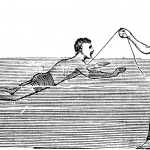Lifeguarding outdoors in winter: a chat with an open water lifeguard
We chat to Francesca Ridgard, a lifeguard at London Royal Docks, to find out what it’s like to lifeguard outdoors in winter.
How different is it lifeguarding in winter compared to in the summer?
The key factors of lifeguarding are prevention, recognition and rescue. In the summer, this is a more straightforward exercise given the temperate conditions, but in winter you are much more alert to the weather, water and the people you have swimming. This calls for more engagement with swimmers which is a hugely positive thing. You’re not just providing a safety service, you’re giving an education that helps with a swimmer’s cold water journey and enjoyment of the experience.
How often do you have to enter the water in winter to help swimmers?
Thankfully, I haven’t had to enter the water to help a swimmer yet this season thanks to the information and advice we provide at Love Open Water (LOW). Although sadly, I have had to enter a few times to rescue non-swimmers and those under the influence of drink and drugs. The biggest risk in winter is cold water shock and hypothermia. The difficulty with lifeguarding those risks is that from an outsider’s point of view you can only really tell if a swimmer is in trouble once the effects start to take hold.
What does your lifeguarding training entail for cold water?
Getting in the water, a lot! It is important to know your own body’s limitations, because if someone is in trouble then you need to be able to get them fast and get them out of the water to give them the best chance of recovery. As such, the more you can get in the water to maintain acclimatisation, the better.
At LOW London Royal Docks, the winter lifeguards practise weekly time trials to ensure we can reach swimmers and recover them within set time periods depending on the water temperature.
How do you keep vigilant on cold days?
Interaction with swimmers makes for a busy brain. When you work at regular sites, you become aware of the quirks of the frequent swimmers: Matt who has to outwardly lecture himself to get in the water, Debs and Dani who are always in competition, Scott the Jedi who will be in the water far longer than anyone else, Pete who has more neoprene than a Zone3 warehouse… that combined with the added alertness and attention required for new swimmers keeps you on the ball. It also means you’re quick to notice if there are any changes in a swimmer’s habits so that you can check in on them and make sure they’re not pushing the boundaries.
If you are interested in becoming an RLSS Open Water Lifeguard, find more information at nowca.org/lifeguard-courses. Courses run from April to October at LOW venues.








